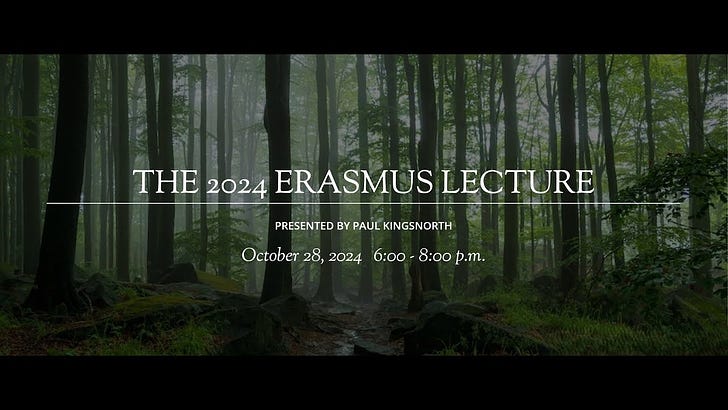It was wonderful to catch up on this “Against Christian Civilization” lecture by Paul Kingsnorth. It is no credit to my skepticism, but I was surprised by his candor while addressing a First Things audience for their 2024 Erasmus Lecture. He criticized Jordan Peterson and Christian nationalism by name while defending the claim that Christ’s teachings call us to let go of Christian civilization as an idol that is twisting our Christianity. I was especially moved by Kingsnorth’s running thread of commentary on the Dakota Indian Christian and cultural commentator Charles Alexander Eastman (Ohiyesa) and his book The Soul of the Indian. Here is a little taste followed by a link to the recording of the lecture (which starts 22 minutes into the posted recording):
Greed is the basis for our economy along with envy. It’s the cornerstone of—the idol of—our time: the universally worshiped God known as economic growth. If we were neither greedy nor envious, the economy would collapse in five minutes. ...Even sloth has been monetized. How else could something as oxymoronic as a leisure industry even exist?
...Love your neighbor. Love your enemy. ...As the Western collapse progresses, we all face a question. Are we going to follow our orders, or are we going to twist them again to justify our role in a coming war?
I would be delighted to hear thoughts and reflections in comments here. And I’ll share one of my own. For all of their clear overlaps, I noticed one interesting difference between what I have heard from David Bentley Hart and what Kingsnorth shared in this lecture. Hart has praised human civilization as a human good (generally speaking) while saying to me once: “culture be damned.” Kingsnorth, in terms more familiar to my own background, praises Christian culture (the founding of hospitals and schools, etc.) while condemning all human civilizations in history (including “Christian” ones) as equally power hungry and corrupt. I have various thoughts on all of this, but I’m mostly looking for ideas and help to better understand for now. Does anyone know what thinkers or traditions of scholarship might sit behind this kind of opposite terminology?




Atavistic, anti-cosmopolitan pietism is to be expected from a man who converted from environmentalism. Worshipping the wilderness forms long grooves in the soul which take a while to sand down.
Nonetheless, I'm grateful he scolded the nationalists. They need it. They are likewise atavistic in their own way.
The prophet always needs to criticize civilization. That's what we keep them around for. A good prophet wants to make civilization better.
Mammon is a funny thing. He only perverts you when you worship him. But if you worship God, you can put Mammon on a string and make him do what he was designed for: solving problems and increasing human flourishing.
Princes worship Mammon because they think he gets them elected. Meanwhile, they believe they can actually create money out of thin air. So they worship the idol they created, and as a result they look more and more like the mute, dumb idol.
All GDP is, is increase. If we have more of it, we have more increase, and we can tithe more. So no, I wouldn't worship it, but it's a pretty darn good thing.
It would be a bad idea to abolish the leisure industry. Bible says that industrious men take dominion by lending to the indolent and making them slaves. Ostensibly this is to teach the slaves something. To discipline them. So, if a redneck wastes all his paycheck on 4x4s, or a millionaire wastes all his paycheck on jetting to Montrieux, there needs to be somebody there, engineering and building those 4x4s and those jets, so that industrious people can take that money away from those lazy people and do something good with it.
Thank you Jesse for holding the space here. As someone who has been recently received into the EO Communion, I am wrestling with what I perceive to be (perhaps wrongly) an intrinsic relationship between the ecclesial structure and the machinations of imperial ideology, even in a Church that supposedly resits a monarchical ordering. My question, which is perhaps a similar one to the one you are asking, is what does Orthodoxy, truly divested of its imperial clothing, look like? Is that even a possibility?